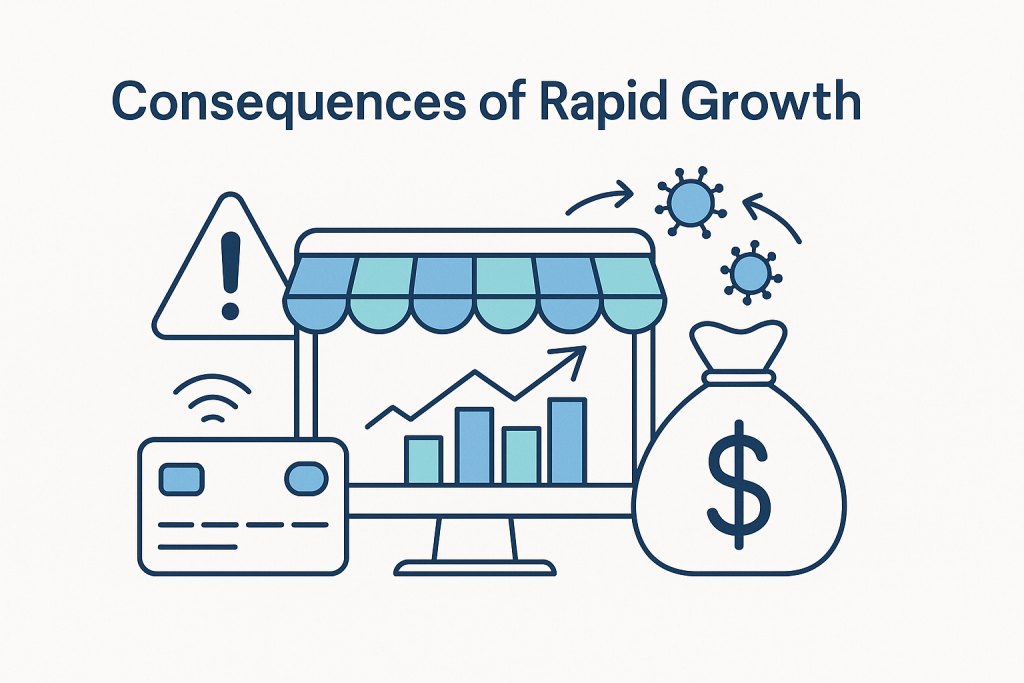In the fast-paced world of e-commerce, businesses sometimes experience sudden surges in payment activity. While this can indicate healthy growth, a rapid and abnormal increase in payment flows can also trigger serious issues — especially when working with a payment service provider (psp).
Understanding the risks associated with these spikes is crucial. At Payment.net, we help businesses maintain stable, secure, and scalable payment systems. In this article, we explore the main consequences of payment flow surges and how merchants can manage them effectively.
What causes sudden spikes in payment flows?
There are several reasons why a merchant might experience an unexpected rise in transaction volume:
- seasonal demand: events like Black Friday, Cyber Monday, or holiday sales often drive huge traffic spikes
- successful marketing campaigns: viral promotions or influencer partnerships can generate a sudden surge in sales
- new product launches: releasing a highly anticipated item can cause a transaction rush
- external events: geopolitical, economic, or societal shifts (like pandemics) can change buying behavior overnight
Although these events are generally positive, they can overwhelm your payment infrastructure if you and your psp aren’t fully prepared.
Potential consequences of a payment flow spike
1. Transaction declines and payment failures
A sudden spike in payments may trigger risk flags within your psp’s fraud detection systems. If the transaction volume surpasses historical norms, the system may incorrectly classify them as fraudulent. This can result in:
- declined or delayed transactions
- payment blocks by card networks such as Visa or Mastercard
- temporary suspension of payouts
These disruptions can lead to lost revenue and damaged customer trust.
2. Increased exposure to fraud
A higher transaction volume also increases your exposure to fraud and chargebacks. If fraud prevention tools aren’t ready to scale, you risk:
- chargeback surges: more transactions can mean more disputes, especially if fulfillment or customer support lags
- stricter psp controls: some providers may implement temporary holds, enhanced verification, or freeze funds for investigation
- account reviews or limitations if the risk profile suddenly changes
3. Payment processing delays
Even if transactions are approved, settlement delays can occur. PSPs may take longer to process payouts during periods of abnormal volume, affecting your cash flow. Slower authorizations can also frustrate customers and lead to abandoned checkouts.
4. Account holds or freezes
In extreme cases, a PSP may freeze your merchant account if the increase in payment activity appears too irregular or risky. Triggers can include:
- a sharp, unexplained rise in volume
- activity in high-risk sectors or countries
- a history of chargebacks or compliance issues
A frozen account can block all transactions, resulting in revenue loss and customer dissatisfaction.
5. Higher processing fees
Some PSPs adjust their fee structures when transaction volumes spike. This is especially true if your business is reclassified as higher-risk due to the surge. Unexpected fee hikes can erode your profit margins and increase operational costs.
How to manage rapid increases in payment flows
1. Monitor transaction activity in real time
Track your payment volume daily to detect abnormal patterns early. Use dashboards and alerts to stay informed about spikes and performance shifts. Being proactive helps avoid surprise interventions from your PSP.
2. Communicate with your psp
Always inform your PSP in advance of upcoming events like major campaigns, product launches, or seasonal promotions. This allows them to raise thresholds, adjust fraud filters, and avoid mistakenly flagging legitimate activity.
3. Optimize fraud prevention tools
Ensure your system includes scalable fraud detection mechanisms such as:
- 3D Secure authentication
- AI-based behavior analysis
- tokenization and encryption
- real-time monitoring with rules-based triggers
These tools reduce risk without slowing down legitimate transactions.
4. Set payment authorization controls
Define clear transaction thresholds and verification workflows with your PSP. High-value transactions can be flagged for review before being approved, balancing risk control and customer satisfaction.
5. Prepare for chargebacks
If volume surges lead to more disputes, be ready:
- use chargeback management tools
- provide clear receipts, return policies, and tracking information
- maintain fast, helpful customer service to defuse complaints early
Being organized will limit losses and maintain a healthy chargeback ratio.
Turning payment spikes into sustainable growth opportunities
A spike in payment volume can be a sign of growth — but it also introduces potential disruptions, from fraud risk to frozen accounts. By staying alert, communicating with your PSP, and preparing your payment systems, you can scale safely and maintain operational stability.
At Payment.net, we help merchants stay ready for growth with secure, flexible payment solutions that adapt to your needs.
💡 Need help managing your payment flows during peak periods?
Contact us today and let Payment.net support your success — no matter how fast you grow.

Are you having trouble obtaining a merchant account?
If you run an innovative business, feel free to contact our expert to guide you in choosing the best payment service provider tailored to your needs.


